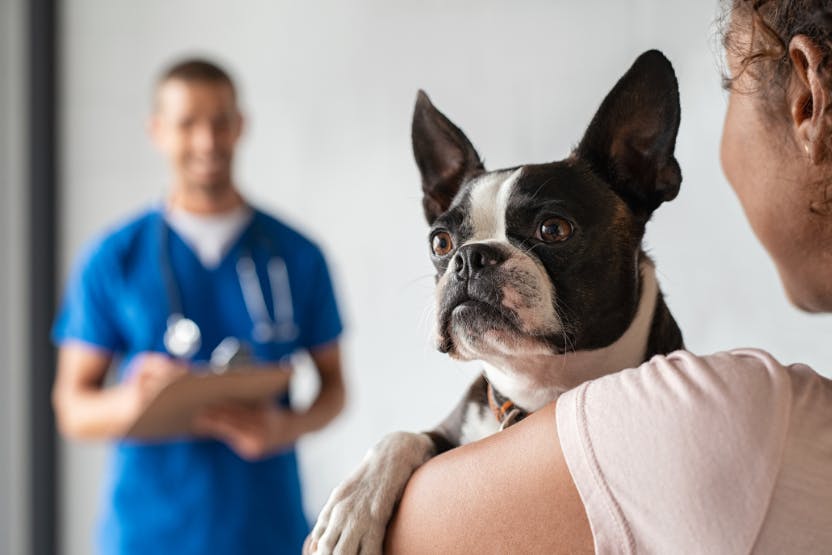Can a Dog Get Rabies Even If Vaccinated? Yes. While vaccines are very effective, they are not 100% foolproof.
Rabies is a serious disease that affects both animals and humans. Vaccination is a key way to protect pets from this deadly virus. Many dog owners believe that once their pet is vaccinated, they are completely safe. However, there are several factors to consider.
The effectiveness of a vaccine can vary based on the dog’s health, age, and the timing of the vaccination. Understanding these factors is important for every dog owner. It helps ensure your furry friend stays safe from rabies and other health risks. Let’s explore this topic further to clear up any confusion.
Table of Contents

Credit: wagwalking.com
Introduction To Rabies And Vaccination
Rabies is a serious disease that affects both animals and humans. Understanding rabies is essential for dog owners. Vaccination plays a crucial role in protecting dogs. But can a vaccinated dog still get rabies? Let’s explore.
Rabies Virus Basics
Rabies is caused by the rabies virus. This virus is usually found in the saliva of infected animals. Common carriers include:
- Bats
- Raccoons
- Skunks
- Foxes
Once infected, the virus travels to the brain. Symptoms can appear weeks or months after exposure. Common signs of rabies include:
- Behavior changes
- Fear of water
- Seizures
- Paralysis
Rabies is nearly always fatal once symptoms appear. Immediate treatment is crucial after exposure.
Importance Of Dog Vaccination
Vaccination is vital for dog health. It protects against rabies and other diseases. Here are key points about the importance of dog vaccination:
- Prevents rabies: Vaccination stops rabies in its tracks.
- Legal requirement: Many places require rabies vaccination.
- Protects community: Vaccinated dogs help keep other pets safe.
- Less stress for owners: Knowing your dog is protected offers peace of mind.
A dog’s first rabies vaccine is usually given at 12-16 weeks. Booster shots follow as recommended by a veterinarian. Regular vaccination ensures ongoing protection.
Understanding rabies and vaccination helps keep dogs healthy. It also protects families and communities from this deadly virus.
Vaccine Efficacy And Limitations
Vaccines are important for preventing rabies in dogs. They help build immunity against the virus. However, no vaccine is 100% effective. Understanding how vaccines work and their limitations is crucial.
How Vaccines Work
Vaccines train the immune system to recognize and fight off diseases. They contain weakened or inactivated parts of the virus. This exposure helps the body prepare for real infections.
- Stimulates immune response: The body produces antibodies.
- Memory cells: These cells remember the virus.
- Quick action: If exposed to the virus, the body reacts fast.
Factors Affecting Vaccine Success
Several factors can influence how well a vaccine works. Understanding these factors can help ensure your dog stays protected.
| Factor | Description |
|---|---|
| Age | Young puppies may need multiple doses. |
| Health status | Illness can weaken the immune response. |
| Storage conditions | Improper storage can reduce vaccine effectiveness. |
| Time since vaccination | Immunity may wane over time. |
Regular vet check-ups can ensure your dog’s vaccinations are up to date. Always consult your vet for the best advice.
Rabies Vaccination Protocols
Rabies vaccination is essential for protecting dogs. These protocols help prevent rabies infection. Vaccination keeps your dog safe and helps protect people too. Understanding these protocols is crucial for every dog owner.
Recommended Vaccination Schedule
The rabies vaccination schedule varies by age and local laws. Here is a general guideline:
| Age | Vaccine Type | Notes |
|---|---|---|
| 3 months | Initial rabies vaccine | First dose required by law in many areas. |
| 1 year | Booster shot | Ensures long-term protection. |
| Every 1-3 years | Booster shot | Depends on vaccine type and local regulations. |
Check your local laws for specific requirements. Some areas require more frequent vaccinations.
Booster Shots Significance
Booster shots are crucial for maintaining immunity. They help reinforce the dog’s defense against rabies. Without them, immunity may fade over time.
- Booster shots ensure consistent protection.
- They help prevent rabies outbreaks.
- Regular boosters are essential for law compliance.
Always consult your veterinarian for the best plan. They will guide you based on your dog’s health and lifestyle.

Credit: www.surfsideanimalhospital.com
Breakthrough Infections In Dogs
Breakthrough infections in dogs can occur, even in vaccinated animals. This topic raises concerns for pet owners. Understanding these infections is important for your dog’s health.
Incidence Of Vaccinated Dogs Contracting Rabies
Vaccinated dogs have a low chance of getting rabies. The incidence is rare but not impossible. Here are some key points:
- Vaccination effectiveness is around 90-95%.
- Breakthrough cases may occur due to:
- Improper vaccination.
- Weak immune response.
- Exposure to a high viral load.
Most vaccinated dogs remain safe from rabies. Regular check-ups help ensure your dog stays protected.
Understanding Breakthrough Infections
Breakthrough infections happen when a vaccinated dog contracts a disease. This can occur with rabies, but it’s rare. Understanding this helps to manage risks.
Some factors that contribute to breakthrough infections include:
- Time since vaccination: Immunity may decrease over time.
- Vaccine type: Some vaccines may offer less protection.
- Underlying health issues: Health problems can weaken the immune system.
Regular veterinary visits ensure your dog is healthy and protected. Always follow vaccination schedules. This will help reduce the risk of rabies and other diseases.
Case Studies
Understanding how rabies affects vaccinated dogs can be complex. Real-life cases provide insight into this issue. Here, we look at some important incidents. These cases show how rabies can still affect vaccinated dogs.
Real-life Incidents
Several documented cases highlight the potential for rabies infection. Here are a few notable examples:
-
Case 1: A dog vaccinated against rabies was bitten by a rabid bat.
- After symptoms appeared, the dog tested positive for rabies.
-
Case 2: A vaccinated dog came into contact with an infected raccoon.
- The dog showed signs of rabies despite its vaccination status.
-
Case 3: A stray dog with unknown vaccination status bit a vaccinated dog.
- The vaccinated dog later developed rabies symptoms.
Analysis Of Rabies Contraction Post-vaccination
The rabies vaccine is generally effective. However, there are exceptions. Here’s a closer look:
| Factor | Description |
|---|---|
| Vaccine Efficacy | Vaccines are about 85-95% effective in preventing rabies. |
| Immune Response | Some dogs may not respond well to the vaccine. |
| Type of Exposure | Severe bites from rabid animals increase risk, even in vaccinated dogs. |
| Vaccine Timing | Boosters must be given on schedule for lasting protection. |
In these cases, the risk of rabies infection remains. Vaccination greatly reduces this risk, but it does not eliminate it. Monitoring your dog’s health is essential. Immediate veterinary care is crucial if exposure occurs.
Factors Contributing To Vaccine Failure
Understanding the factors that lead to vaccine failure is crucial. Even vaccinated dogs can get rabies. This situation can happen due to several reasons. Below, we will explore two key factors that contribute to vaccine failure.
Improper Storage And Handling
The way vaccines are stored and handled matters a lot. If vaccines are not kept at the right temperature, they can lose their effectiveness. Here are some points to consider:
- Vaccines should be refrigerated between 35°F and 46°F (2°C to 8°C).
- Do not freeze vaccines. Freezing can ruin them.
- Transport vaccines with care. Avoid temperature extremes.
- Check expiration dates before use. Expired vaccines are ineffective.
Veterinary clinics should follow strict guidelines for storage. Any lapses in these practices can lead to problems.
Genetic And Health Factors In Dogs
Some dogs may not respond well to vaccines due to their genetics. Certain breeds have different immune responses. Health problems can also play a role. Consider these factors:
- Age: Puppies and older dogs may have weaker immune systems.
- Underlying conditions: Diseases like diabetes can affect vaccine response.
- Genetics: Some breeds may not produce enough antibodies.
- Previous reactions: Dogs with past vaccine reactions may have issues.
Regular health check-ups help identify these risks. Speak with your vet about your dog’s health status. This way, you can ensure they are protected.
Preventive Measures Beyond Vaccination
Vaccination is vital for preventing rabies. It is not the only step. Owners must take extra measures to protect their dogs. These measures help reduce the chance of exposure to rabies.
Reducing Exposure To Rabies
Limiting your dog’s exposure to rabies is crucial. Here are some effective ways:
- Keep dogs on a leash: Always use a leash during walks.
- Avoid wild animals: Stay away from raccoons, bats, and foxes.
- Secure your property: Fences can prevent wild animals from entering.
- Supervise outdoor play: Watch your dog while they play outside.
Be cautious in areas known for rabies cases. Check local reports for rabies outbreaks. Knowledge is power.
Immediate Steps After Suspected Exposure
Act quickly if your dog may have been exposed to rabies. Follow these steps:
- Contact your veterinarian: Explain the situation immediately.
- Observe your dog: Look for any unusual behavior or symptoms.
- Isolate your pet: Keep them away from other animals and people.
- Report the incident: Notify local health authorities if needed.
Keep records of any potential exposures. This information can assist your vet.
| Action | Description |
|---|---|
| Contact Vet | Reach out for advice and next steps. |
| Monitor Behavior | Watch for signs of illness or distress. |
| Isolate | Prevent contact with others until assessed. |
| Notify Authorities | Report any rabies exposure to local health services. |
Staying informed and proactive protects your dog. Prevention is always better than cure.
Legal And Ethical Considerations
Understanding the legal and ethical aspects of rabies vaccination is crucial. Rabies is a serious disease. It affects both humans and animals. Laws about rabies vaccinations vary by location. Pet owners must know these laws. They also have ethical responsibilities toward their pets and the community.
Mandates On Rabies Vaccination
Many regions have strict laws about rabies vaccinations. These laws help protect public health. Here are some key points:
- Most states require dogs to be vaccinated.
- Vaccination must occur by a certain age.
- Booster shots are often required every 1 to 3 years.
- Failure to vaccinate can lead to fines.
Some areas may have special rules. For example, certain breeds may need extra care. Local regulations should always be checked.
Responsibilities Of Pet Owners
Pet owners have important responsibilities. They must ensure their pets are vaccinated. This is not just a legal duty. It’s also an ethical one. Here are key responsibilities:
- Keep vaccination records updated.
- Schedule regular vet visits.
- Educate yourself about rabies and its risks.
- Report any rabies exposure to authorities.
Pet owners should also watch their dogs. If a vaccinated dog shows signs of illness, seek help. Understanding rabies helps protect everyone.
The Future Of Rabies Prevention
Rabies remains a serious disease. Vaccination plays a vital role. New methods and studies aim to make prevention even better. Understanding these advancements is key for pet owners.
Advancements In Vaccine Technology
Vaccine technology is improving rapidly. New vaccines are safer and more effective. Here are some key advancements:
- DNA vaccines: These use genetic material to stimulate an immune response.
- Recombinant vaccines: These combine parts of the virus with other harmless viruses.
- Extended duration vaccines: These offer longer-lasting protection with fewer doses.
These innovations help ensure that vaccinated dogs have strong protection. The goal is to reduce the chances of rabies transmission.
Emerging Research And Studies
Research continues to explore rabies prevention methods. Several studies show promising results:
- Investigating the immune response in vaccinated dogs.
- Studying rabies variants in different regions.
- Analyzing the effectiveness of booster shots.
These studies aim to improve vaccine schedules. They also focus on understanding how long protection lasts. Continuous research helps adapt to changing virus strains.
| Research Focus | Purpose |
|---|---|
| Immune Response | Enhance vaccine effectiveness |
| Rabies Variants | Address regional risks |
| Booster Shots | Determine optimal timing for vaccination |
Staying informed about these studies is essential. It helps pet owners make the best choices for their dogs.
Frequently Asked Questions
Can A Vaccinated Dog Still Get Rabies?
Yes, a vaccinated dog can still get rabies, but the risk is very low. Vaccines are highly effective, but no vaccine offers 100% protection. Factors such as improper vaccination or a weakened immune system may increase susceptibility. Regular booster shots help maintain immunity against rabies.
How Long Does Rabies Vaccine Protect Dogs?
The rabies vaccine typically protects dogs for one to three years, depending on the vaccine type used. After the initial vaccination, dogs should receive booster shots as recommended by a veterinarian. Staying updated on vaccinations is crucial for maintaining your dog’s health and safety against rabies.
What Should I Do If My Dog Bites Someone?
If your dog bites someone, stay calm and assess the situation. Clean the wound if it’s safe, and seek medical attention for the person. Notify the local health department and provide vaccination records for your dog. Follow your veterinarian’s advice on monitoring your dog for signs of rabies.
Can My Dog Get Rabies From A Vaccinated Animal?
While it’s rare, a vaccinated animal can theoretically transmit rabies. Vaccines significantly reduce the likelihood of virus shedding, but breakthrough infections can occur. It’s essential to keep your dog away from wild animals and ensure regular vaccinations to minimize any risk.
Conclusion
Vaccination greatly reduces the chance of rabies in dogs. Yet, no vaccine offers 100% protection. A vaccinated dog can still get rabies if exposed. Regular check-ups and booster shots are essential. Monitor your dog’s health closely. If you suspect exposure, contact a vet immediately.
Understanding these facts helps keep your pet safe. Stay informed and protect your furry friend. Rabies is serious, but prevention works. Keep your dog vaccinated and watch for signs. A proactive approach is always best.



